Business Environment Analysis Report: LLOYD'S TSB Bank UK
VerifiedAdded on 2019/12/04
|13
|4197
|285
Report
AI Summary
This report provides a comprehensive analysis of the business environment surrounding LLOYD'S TSB bank. It begins by defining the business environment and its importance, then proceeds to examine the different types of organizations in the UK, focusing on LLOYD'S TSB as a public company. The report identifies and analyzes the objectives of key stakeholders, including customers, employees, and the government, and explores how LLOYD'S TSB meets their expectations. It delves into the bank's corporate social and environmental responsibilities and discusses different economic systems, including command and free market economies, along with their resource allocation methods. The report further assesses the impact of UK fiscal and monetary policies, as well as competition policies, on LLOYD'S TSB's operations. It examines how market structures and conditions influence pricing strategies, the role of market forces, and the impact of the business and cultural environment. Finally, the report investigates the importance of international trade, the impact of global factors, and the influence of EU policy on LLOYD'S TSB, concluding with a summary of the key findings and references.
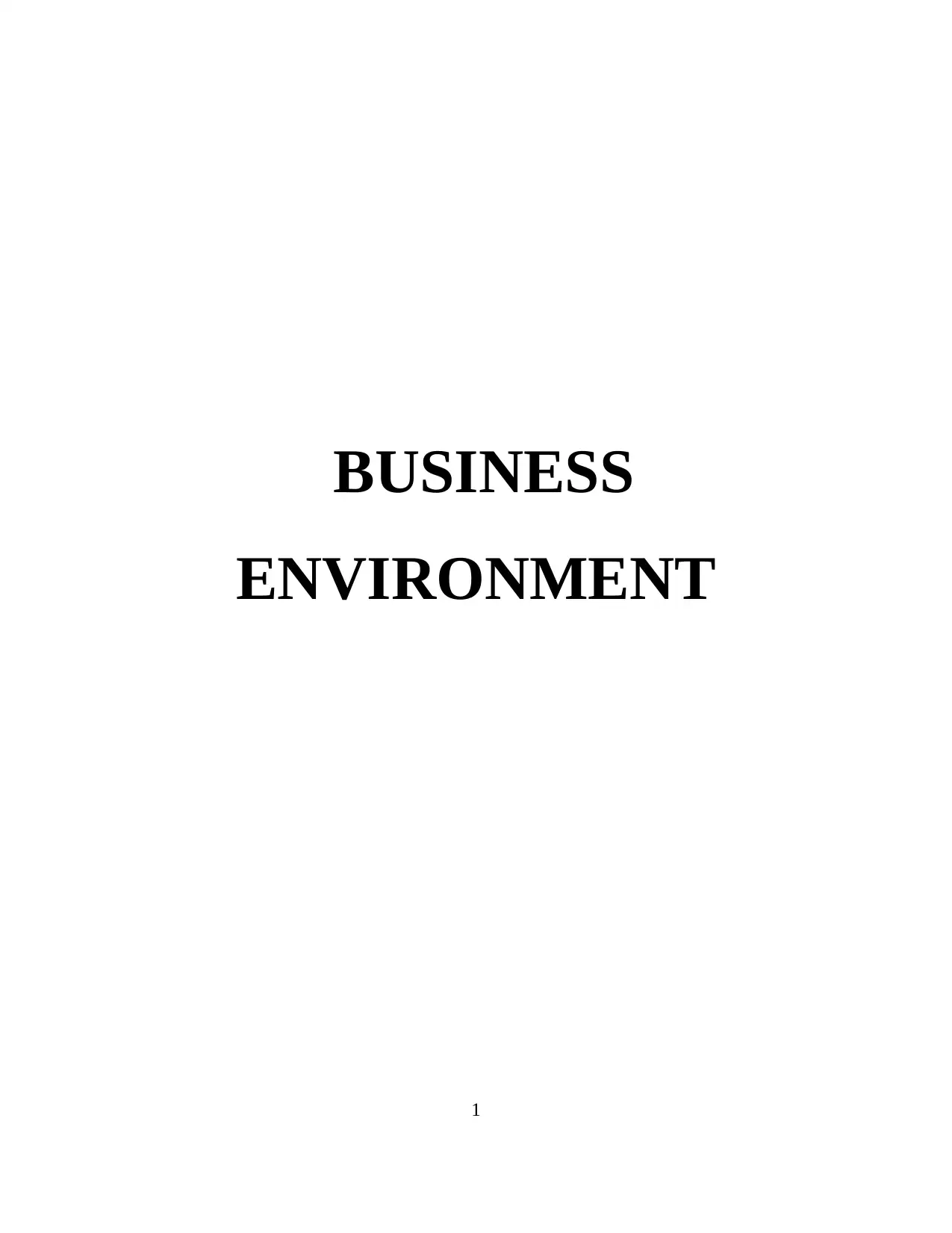
BUSINESS
ENVIRONMENT
1
ENVIRONMENT
1
Paraphrase This Document
Need a fresh take? Get an instant paraphrase of this document with our AI Paraphraser
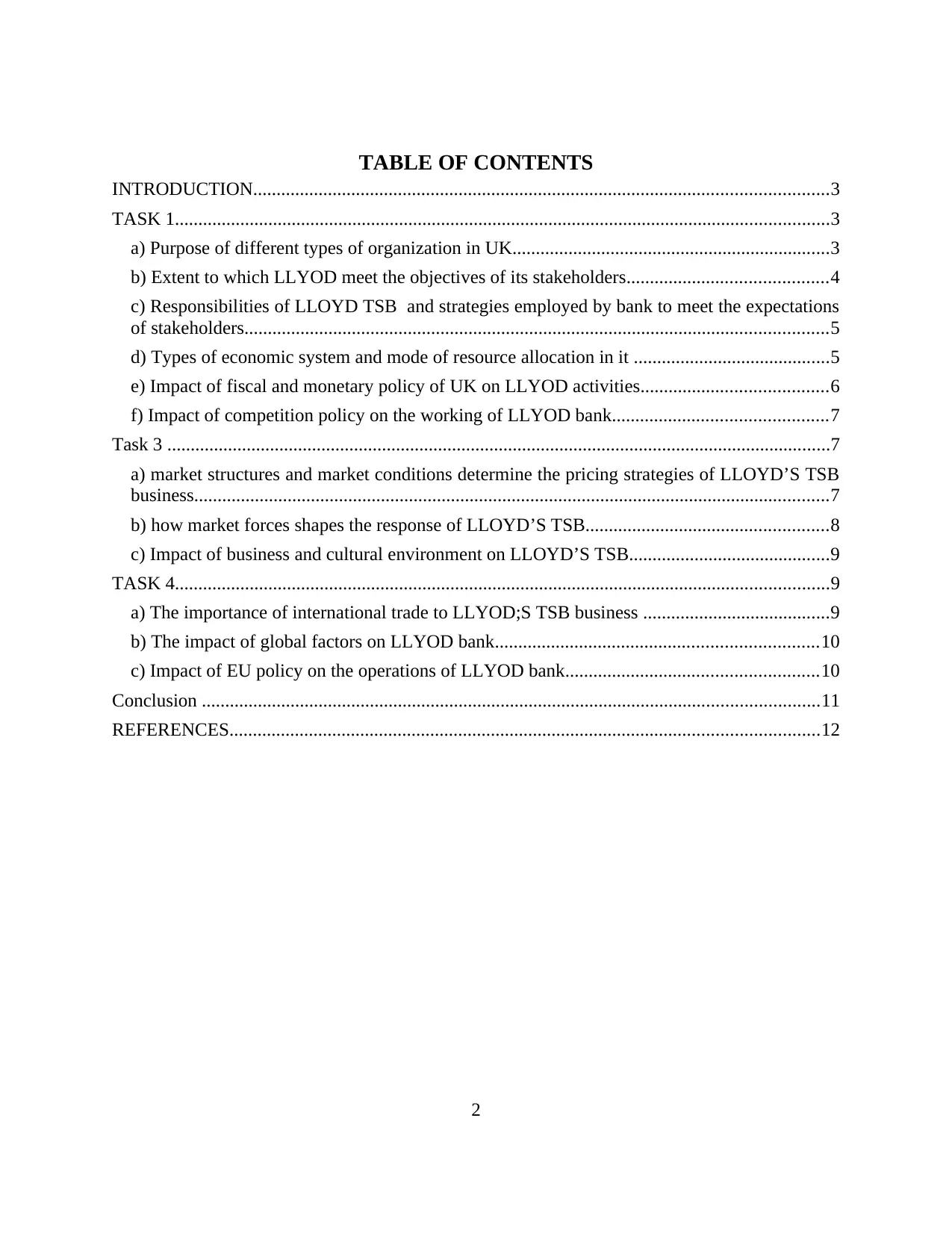
TABLE OF CONTENTS
INTRODUCTION...........................................................................................................................3
TASK 1............................................................................................................................................3
a) Purpose of different types of organization in UK....................................................................3
b) Extent to which LLYOD meet the objectives of its stakeholders...........................................4
c) Responsibilities of LLOYD TSB and strategies employed by bank to meet the expectations
of stakeholders.............................................................................................................................5
d) Types of economic system and mode of resource allocation in it ..........................................5
e) Impact of fiscal and monetary policy of UK on LLYOD activities........................................6
f) Impact of competition policy on the working of LLYOD bank..............................................7
Task 3 ..............................................................................................................................................7
a) market structures and market conditions determine the pricing strategies of LLOYD’S TSB
business........................................................................................................................................7
b) how market forces shapes the response of LLOYD’S TSB....................................................8
c) Impact of business and cultural environment on LLOYD’S TSB...........................................9
TASK 4............................................................................................................................................9
a) The importance of international trade to LLYOD;S TSB business ........................................9
b) The impact of global factors on LLYOD bank.....................................................................10
c) Impact of EU policy on the operations of LLYOD bank......................................................10
Conclusion ....................................................................................................................................11
REFERENCES..............................................................................................................................12
2
INTRODUCTION...........................................................................................................................3
TASK 1............................................................................................................................................3
a) Purpose of different types of organization in UK....................................................................3
b) Extent to which LLYOD meet the objectives of its stakeholders...........................................4
c) Responsibilities of LLOYD TSB and strategies employed by bank to meet the expectations
of stakeholders.............................................................................................................................5
d) Types of economic system and mode of resource allocation in it ..........................................5
e) Impact of fiscal and monetary policy of UK on LLYOD activities........................................6
f) Impact of competition policy on the working of LLYOD bank..............................................7
Task 3 ..............................................................................................................................................7
a) market structures and market conditions determine the pricing strategies of LLOYD’S TSB
business........................................................................................................................................7
b) how market forces shapes the response of LLOYD’S TSB....................................................8
c) Impact of business and cultural environment on LLOYD’S TSB...........................................9
TASK 4............................................................................................................................................9
a) The importance of international trade to LLYOD;S TSB business ........................................9
b) The impact of global factors on LLYOD bank.....................................................................10
c) Impact of EU policy on the operations of LLYOD bank......................................................10
Conclusion ....................................................................................................................................11
REFERENCES..............................................................................................................................12
2
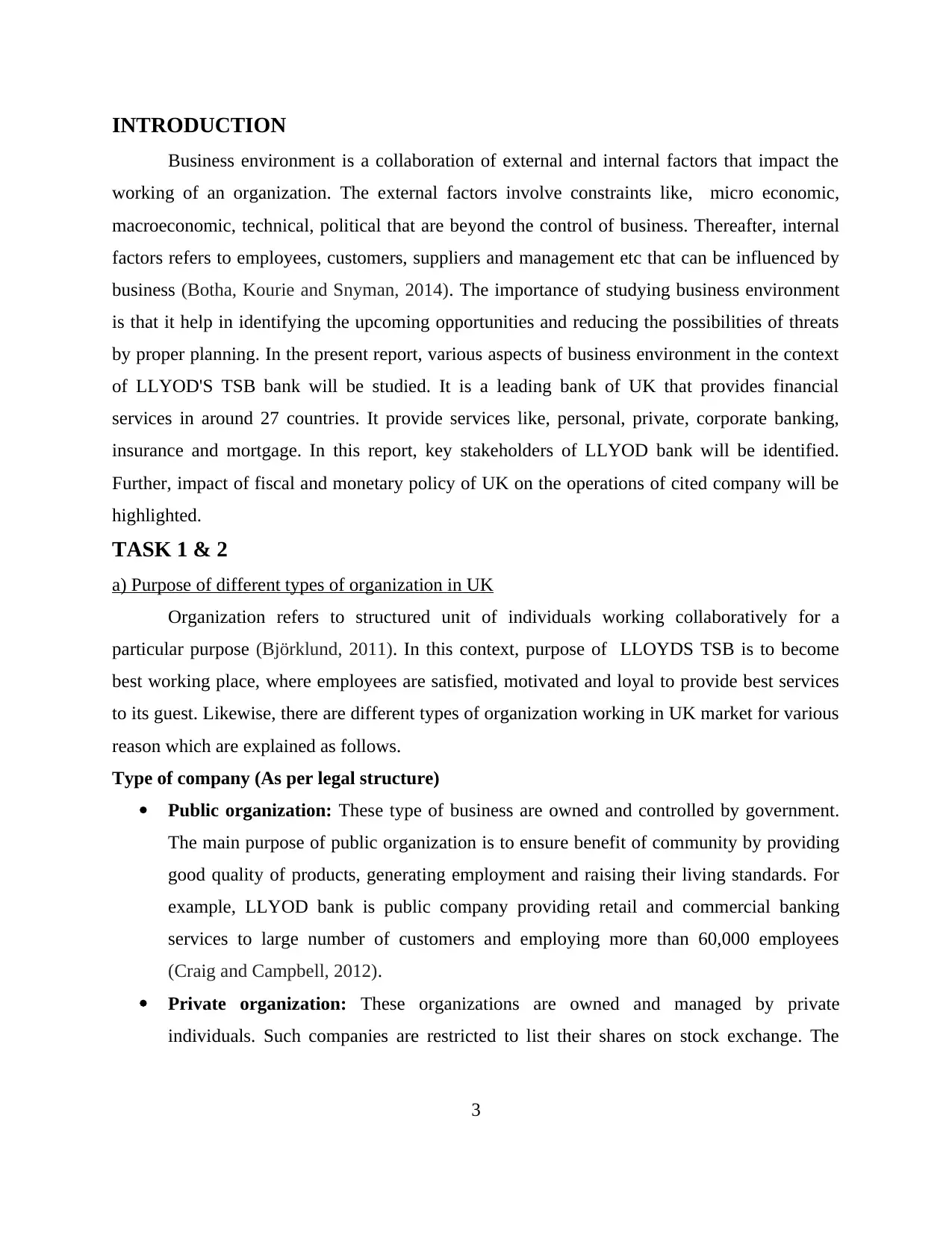
INTRODUCTION
Business environment is a collaboration of external and internal factors that impact the
working of an organization. The external factors involve constraints like, micro economic,
macroeconomic, technical, political that are beyond the control of business. Thereafter, internal
factors refers to employees, customers, suppliers and management etc that can be influenced by
business (Botha, Kourie and Snyman, 2014). The importance of studying business environment
is that it help in identifying the upcoming opportunities and reducing the possibilities of threats
by proper planning. In the present report, various aspects of business environment in the context
of LLYOD'S TSB bank will be studied. It is a leading bank of UK that provides financial
services in around 27 countries. It provide services like, personal, private, corporate banking,
insurance and mortgage. In this report, key stakeholders of LLYOD bank will be identified.
Further, impact of fiscal and monetary policy of UK on the operations of cited company will be
highlighted.
TASK 1 & 2
a) Purpose of different types of organization in UK
Organization refers to structured unit of individuals working collaboratively for a
particular purpose (Björklund, 2011). In this context, purpose of LLOYDS TSB is to become
best working place, where employees are satisfied, motivated and loyal to provide best services
to its guest. Likewise, there are different types of organization working in UK market for various
reason which are explained as follows.
Type of company (As per legal structure)
Public organization: These type of business are owned and controlled by government.
The main purpose of public organization is to ensure benefit of community by providing
good quality of products, generating employment and raising their living standards. For
example, LLYOD bank is public company providing retail and commercial banking
services to large number of customers and employing more than 60,000 employees
(Craig and Campbell, 2012).
Private organization: These organizations are owned and managed by private
individuals. Such companies are restricted to list their shares on stock exchange. The
3
Business environment is a collaboration of external and internal factors that impact the
working of an organization. The external factors involve constraints like, micro economic,
macroeconomic, technical, political that are beyond the control of business. Thereafter, internal
factors refers to employees, customers, suppliers and management etc that can be influenced by
business (Botha, Kourie and Snyman, 2014). The importance of studying business environment
is that it help in identifying the upcoming opportunities and reducing the possibilities of threats
by proper planning. In the present report, various aspects of business environment in the context
of LLYOD'S TSB bank will be studied. It is a leading bank of UK that provides financial
services in around 27 countries. It provide services like, personal, private, corporate banking,
insurance and mortgage. In this report, key stakeholders of LLYOD bank will be identified.
Further, impact of fiscal and monetary policy of UK on the operations of cited company will be
highlighted.
TASK 1 & 2
a) Purpose of different types of organization in UK
Organization refers to structured unit of individuals working collaboratively for a
particular purpose (Björklund, 2011). In this context, purpose of LLOYDS TSB is to become
best working place, where employees are satisfied, motivated and loyal to provide best services
to its guest. Likewise, there are different types of organization working in UK market for various
reason which are explained as follows.
Type of company (As per legal structure)
Public organization: These type of business are owned and controlled by government.
The main purpose of public organization is to ensure benefit of community by providing
good quality of products, generating employment and raising their living standards. For
example, LLYOD bank is public company providing retail and commercial banking
services to large number of customers and employing more than 60,000 employees
(Craig and Campbell, 2012).
Private organization: These organizations are owned and managed by private
individuals. Such companies are restricted to list their shares on stock exchange. The
3
⊘ This is a preview!⊘
Do you want full access?
Subscribe today to unlock all pages.

Trusted by 1+ million students worldwide
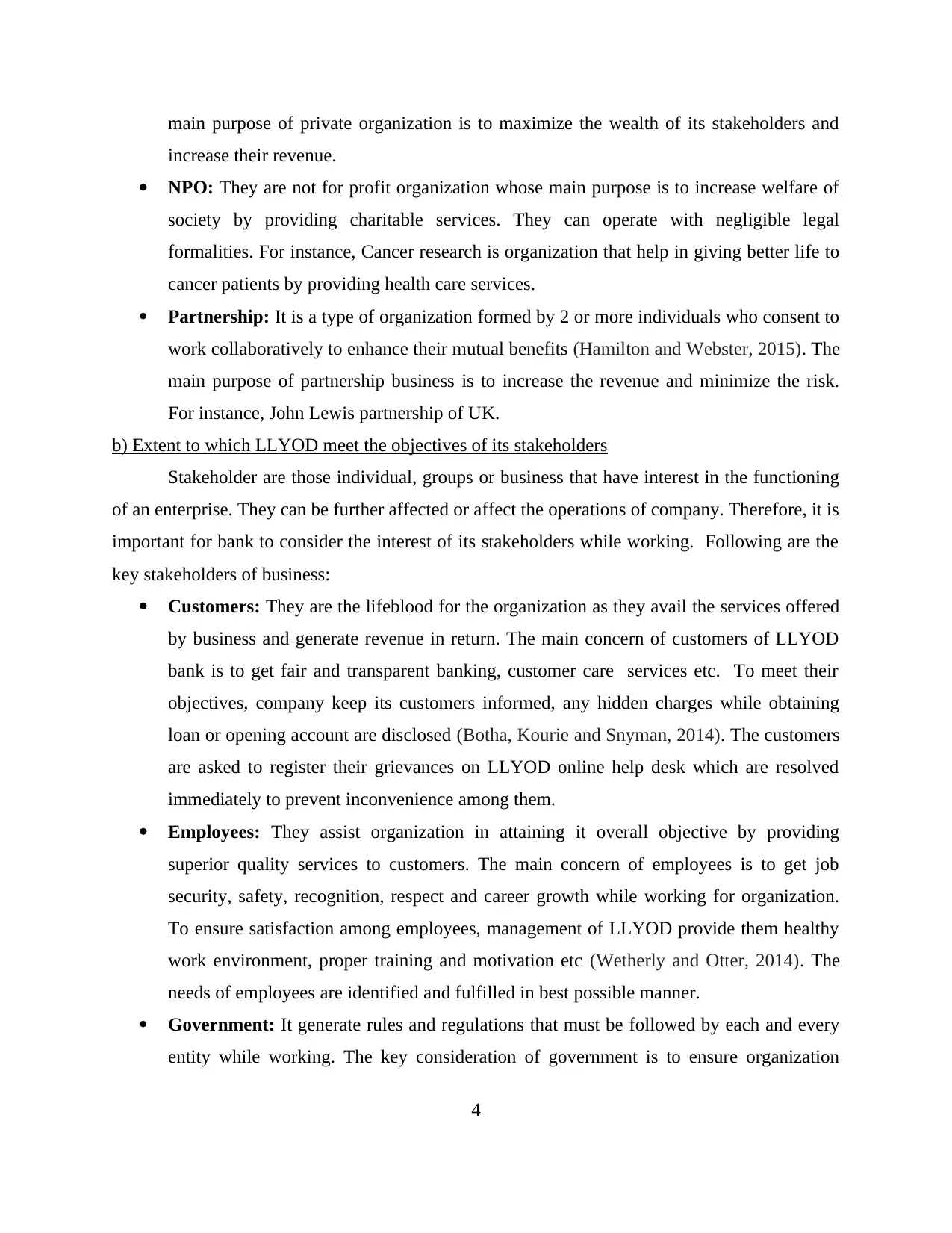
main purpose of private organization is to maximize the wealth of its stakeholders and
increase their revenue.
NPO: They are not for profit organization whose main purpose is to increase welfare of
society by providing charitable services. They can operate with negligible legal
formalities. For instance, Cancer research is organization that help in giving better life to
cancer patients by providing health care services.
Partnership: It is a type of organization formed by 2 or more individuals who consent to
work collaboratively to enhance their mutual benefits (Hamilton and Webster, 2015). The
main purpose of partnership business is to increase the revenue and minimize the risk.
For instance, John Lewis partnership of UK.
b) Extent to which LLYOD meet the objectives of its stakeholders
Stakeholder are those individual, groups or business that have interest in the functioning
of an enterprise. They can be further affected or affect the operations of company. Therefore, it is
important for bank to consider the interest of its stakeholders while working. Following are the
key stakeholders of business:
Customers: They are the lifeblood for the organization as they avail the services offered
by business and generate revenue in return. The main concern of customers of LLYOD
bank is to get fair and transparent banking, customer care services etc. To meet their
objectives, company keep its customers informed, any hidden charges while obtaining
loan or opening account are disclosed (Botha, Kourie and Snyman, 2014). The customers
are asked to register their grievances on LLYOD online help desk which are resolved
immediately to prevent inconvenience among them.
Employees: They assist organization in attaining it overall objective by providing
superior quality services to customers. The main concern of employees is to get job
security, safety, recognition, respect and career growth while working for organization.
To ensure satisfaction among employees, management of LLYOD provide them healthy
work environment, proper training and motivation etc (Wetherly and Otter, 2014). The
needs of employees are identified and fulfilled in best possible manner.
Government: It generate rules and regulations that must be followed by each and every
entity while working. The key consideration of government is to ensure organization
4
increase their revenue.
NPO: They are not for profit organization whose main purpose is to increase welfare of
society by providing charitable services. They can operate with negligible legal
formalities. For instance, Cancer research is organization that help in giving better life to
cancer patients by providing health care services.
Partnership: It is a type of organization formed by 2 or more individuals who consent to
work collaboratively to enhance their mutual benefits (Hamilton and Webster, 2015). The
main purpose of partnership business is to increase the revenue and minimize the risk.
For instance, John Lewis partnership of UK.
b) Extent to which LLYOD meet the objectives of its stakeholders
Stakeholder are those individual, groups or business that have interest in the functioning
of an enterprise. They can be further affected or affect the operations of company. Therefore, it is
important for bank to consider the interest of its stakeholders while working. Following are the
key stakeholders of business:
Customers: They are the lifeblood for the organization as they avail the services offered
by business and generate revenue in return. The main concern of customers of LLYOD
bank is to get fair and transparent banking, customer care services etc. To meet their
objectives, company keep its customers informed, any hidden charges while obtaining
loan or opening account are disclosed (Botha, Kourie and Snyman, 2014). The customers
are asked to register their grievances on LLYOD online help desk which are resolved
immediately to prevent inconvenience among them.
Employees: They assist organization in attaining it overall objective by providing
superior quality services to customers. The main concern of employees is to get job
security, safety, recognition, respect and career growth while working for organization.
To ensure satisfaction among employees, management of LLYOD provide them healthy
work environment, proper training and motivation etc (Wetherly and Otter, 2014). The
needs of employees are identified and fulfilled in best possible manner.
Government: It generate rules and regulations that must be followed by each and every
entity while working. The key consideration of government is to ensure organization
4
Paraphrase This Document
Need a fresh take? Get an instant paraphrase of this document with our AI Paraphraser
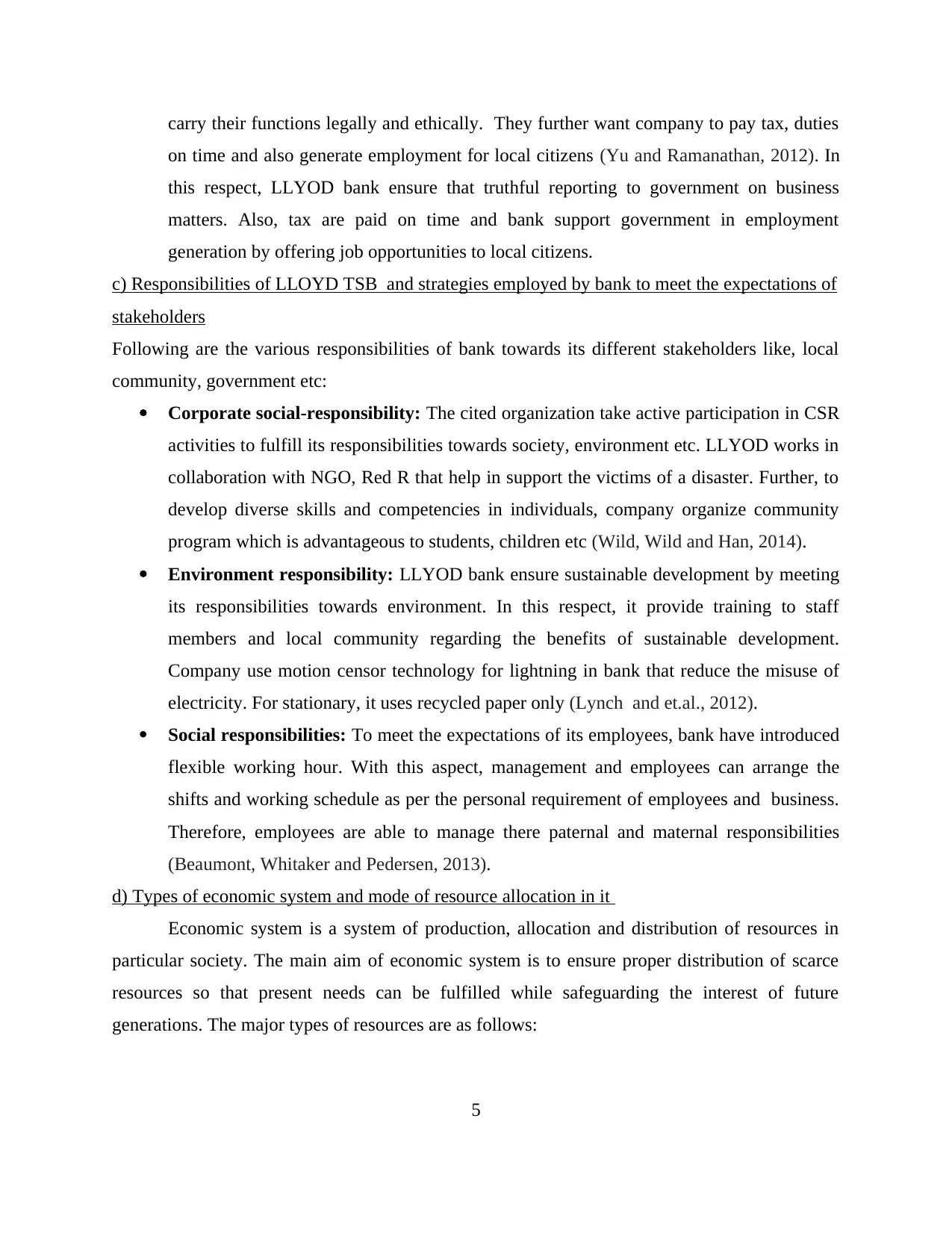
carry their functions legally and ethically. They further want company to pay tax, duties
on time and also generate employment for local citizens (Yu and Ramanathan, 2012). In
this respect, LLYOD bank ensure that truthful reporting to government on business
matters. Also, tax are paid on time and bank support government in employment
generation by offering job opportunities to local citizens.
c) Responsibilities of LLOYD TSB and strategies employed by bank to meet the expectations of
stakeholders
Following are the various responsibilities of bank towards its different stakeholders like, local
community, government etc:
Corporate social-responsibility: The cited organization take active participation in CSR
activities to fulfill its responsibilities towards society, environment etc. LLYOD works in
collaboration with NGO, Red R that help in support the victims of a disaster. Further, to
develop diverse skills and competencies in individuals, company organize community
program which is advantageous to students, children etc (Wild, Wild and Han, 2014).
Environment responsibility: LLYOD bank ensure sustainable development by meeting
its responsibilities towards environment. In this respect, it provide training to staff
members and local community regarding the benefits of sustainable development.
Company use motion censor technology for lightning in bank that reduce the misuse of
electricity. For stationary, it uses recycled paper only (Lynch and et.al., 2012).
Social responsibilities: To meet the expectations of its employees, bank have introduced
flexible working hour. With this aspect, management and employees can arrange the
shifts and working schedule as per the personal requirement of employees and business.
Therefore, employees are able to manage there paternal and maternal responsibilities
(Beaumont, Whitaker and Pedersen, 2013).
d) Types of economic system and mode of resource allocation in it
Economic system is a system of production, allocation and distribution of resources in
particular society. The main aim of economic system is to ensure proper distribution of scarce
resources so that present needs can be fulfilled while safeguarding the interest of future
generations. The major types of resources are as follows:
5
on time and also generate employment for local citizens (Yu and Ramanathan, 2012). In
this respect, LLYOD bank ensure that truthful reporting to government on business
matters. Also, tax are paid on time and bank support government in employment
generation by offering job opportunities to local citizens.
c) Responsibilities of LLOYD TSB and strategies employed by bank to meet the expectations of
stakeholders
Following are the various responsibilities of bank towards its different stakeholders like, local
community, government etc:
Corporate social-responsibility: The cited organization take active participation in CSR
activities to fulfill its responsibilities towards society, environment etc. LLYOD works in
collaboration with NGO, Red R that help in support the victims of a disaster. Further, to
develop diverse skills and competencies in individuals, company organize community
program which is advantageous to students, children etc (Wild, Wild and Han, 2014).
Environment responsibility: LLYOD bank ensure sustainable development by meeting
its responsibilities towards environment. In this respect, it provide training to staff
members and local community regarding the benefits of sustainable development.
Company use motion censor technology for lightning in bank that reduce the misuse of
electricity. For stationary, it uses recycled paper only (Lynch and et.al., 2012).
Social responsibilities: To meet the expectations of its employees, bank have introduced
flexible working hour. With this aspect, management and employees can arrange the
shifts and working schedule as per the personal requirement of employees and business.
Therefore, employees are able to manage there paternal and maternal responsibilities
(Beaumont, Whitaker and Pedersen, 2013).
d) Types of economic system and mode of resource allocation in it
Economic system is a system of production, allocation and distribution of resources in
particular society. The main aim of economic system is to ensure proper distribution of scarce
resources so that present needs can be fulfilled while safeguarding the interest of future
generations. The major types of resources are as follows:
5
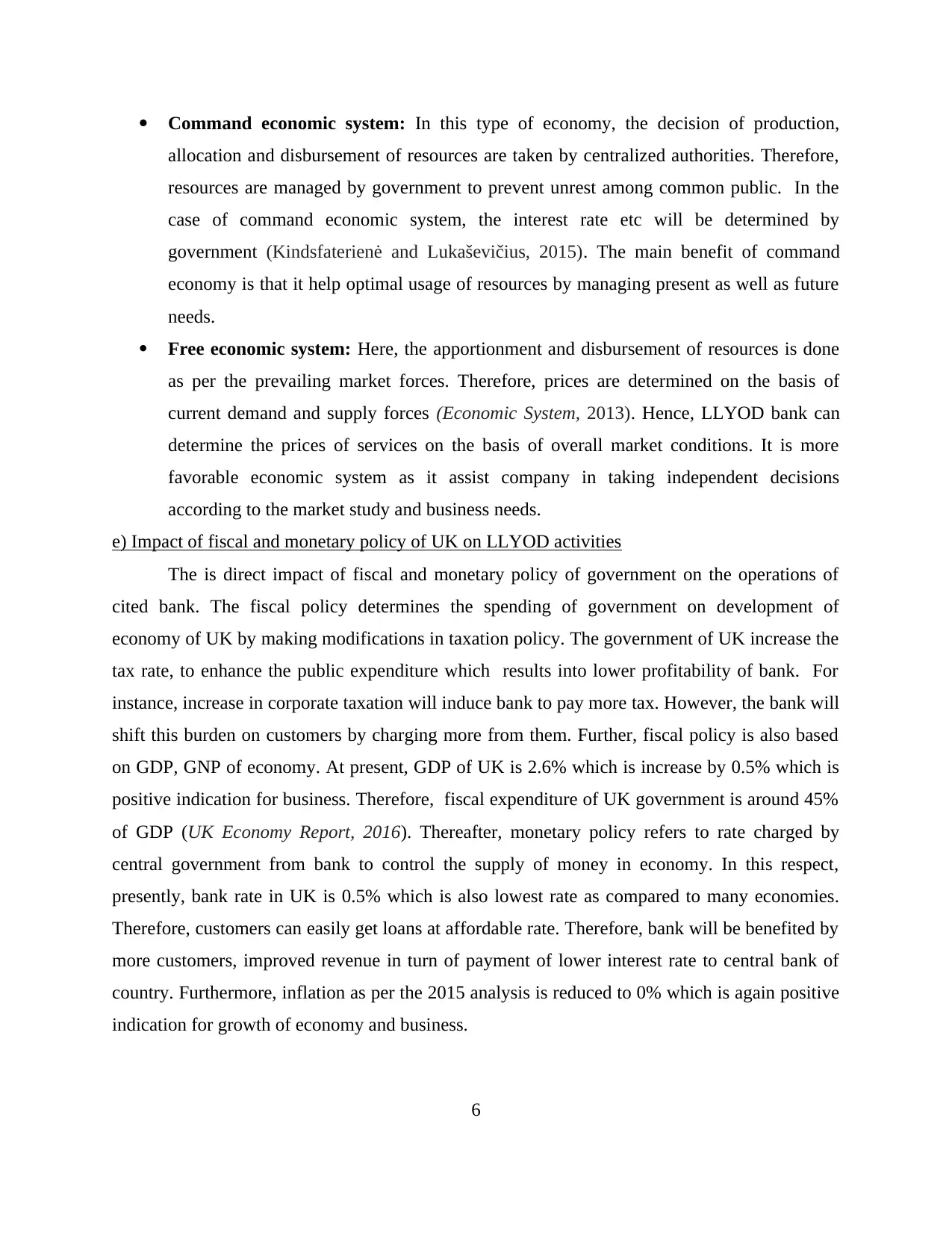
Command economic system: In this type of economy, the decision of production,
allocation and disbursement of resources are taken by centralized authorities. Therefore,
resources are managed by government to prevent unrest among common public. In the
case of command economic system, the interest rate etc will be determined by
government (Kindsfaterienė and Lukaševičius, 2015). The main benefit of command
economy is that it help optimal usage of resources by managing present as well as future
needs.
Free economic system: Here, the apportionment and disbursement of resources is done
as per the prevailing market forces. Therefore, prices are determined on the basis of
current demand and supply forces (Economic System, 2013). Hence, LLYOD bank can
determine the prices of services on the basis of overall market conditions. It is more
favorable economic system as it assist company in taking independent decisions
according to the market study and business needs.
e) Impact of fiscal and monetary policy of UK on LLYOD activities
The is direct impact of fiscal and monetary policy of government on the operations of
cited bank. The fiscal policy determines the spending of government on development of
economy of UK by making modifications in taxation policy. The government of UK increase the
tax rate, to enhance the public expenditure which results into lower profitability of bank. For
instance, increase in corporate taxation will induce bank to pay more tax. However, the bank will
shift this burden on customers by charging more from them. Further, fiscal policy is also based
on GDP, GNP of economy. At present, GDP of UK is 2.6% which is increase by 0.5% which is
positive indication for business. Therefore, fiscal expenditure of UK government is around 45%
of GDP (UK Economy Report, 2016). Thereafter, monetary policy refers to rate charged by
central government from bank to control the supply of money in economy. In this respect,
presently, bank rate in UK is 0.5% which is also lowest rate as compared to many economies.
Therefore, customers can easily get loans at affordable rate. Therefore, bank will be benefited by
more customers, improved revenue in turn of payment of lower interest rate to central bank of
country. Furthermore, inflation as per the 2015 analysis is reduced to 0% which is again positive
indication for growth of economy and business.
6
allocation and disbursement of resources are taken by centralized authorities. Therefore,
resources are managed by government to prevent unrest among common public. In the
case of command economic system, the interest rate etc will be determined by
government (Kindsfaterienė and Lukaševičius, 2015). The main benefit of command
economy is that it help optimal usage of resources by managing present as well as future
needs.
Free economic system: Here, the apportionment and disbursement of resources is done
as per the prevailing market forces. Therefore, prices are determined on the basis of
current demand and supply forces (Economic System, 2013). Hence, LLYOD bank can
determine the prices of services on the basis of overall market conditions. It is more
favorable economic system as it assist company in taking independent decisions
according to the market study and business needs.
e) Impact of fiscal and monetary policy of UK on LLYOD activities
The is direct impact of fiscal and monetary policy of government on the operations of
cited bank. The fiscal policy determines the spending of government on development of
economy of UK by making modifications in taxation policy. The government of UK increase the
tax rate, to enhance the public expenditure which results into lower profitability of bank. For
instance, increase in corporate taxation will induce bank to pay more tax. However, the bank will
shift this burden on customers by charging more from them. Further, fiscal policy is also based
on GDP, GNP of economy. At present, GDP of UK is 2.6% which is increase by 0.5% which is
positive indication for business. Therefore, fiscal expenditure of UK government is around 45%
of GDP (UK Economy Report, 2016). Thereafter, monetary policy refers to rate charged by
central government from bank to control the supply of money in economy. In this respect,
presently, bank rate in UK is 0.5% which is also lowest rate as compared to many economies.
Therefore, customers can easily get loans at affordable rate. Therefore, bank will be benefited by
more customers, improved revenue in turn of payment of lower interest rate to central bank of
country. Furthermore, inflation as per the 2015 analysis is reduced to 0% which is again positive
indication for growth of economy and business.
6
⊘ This is a preview!⊘
Do you want full access?
Subscribe today to unlock all pages.

Trusted by 1+ million students worldwide
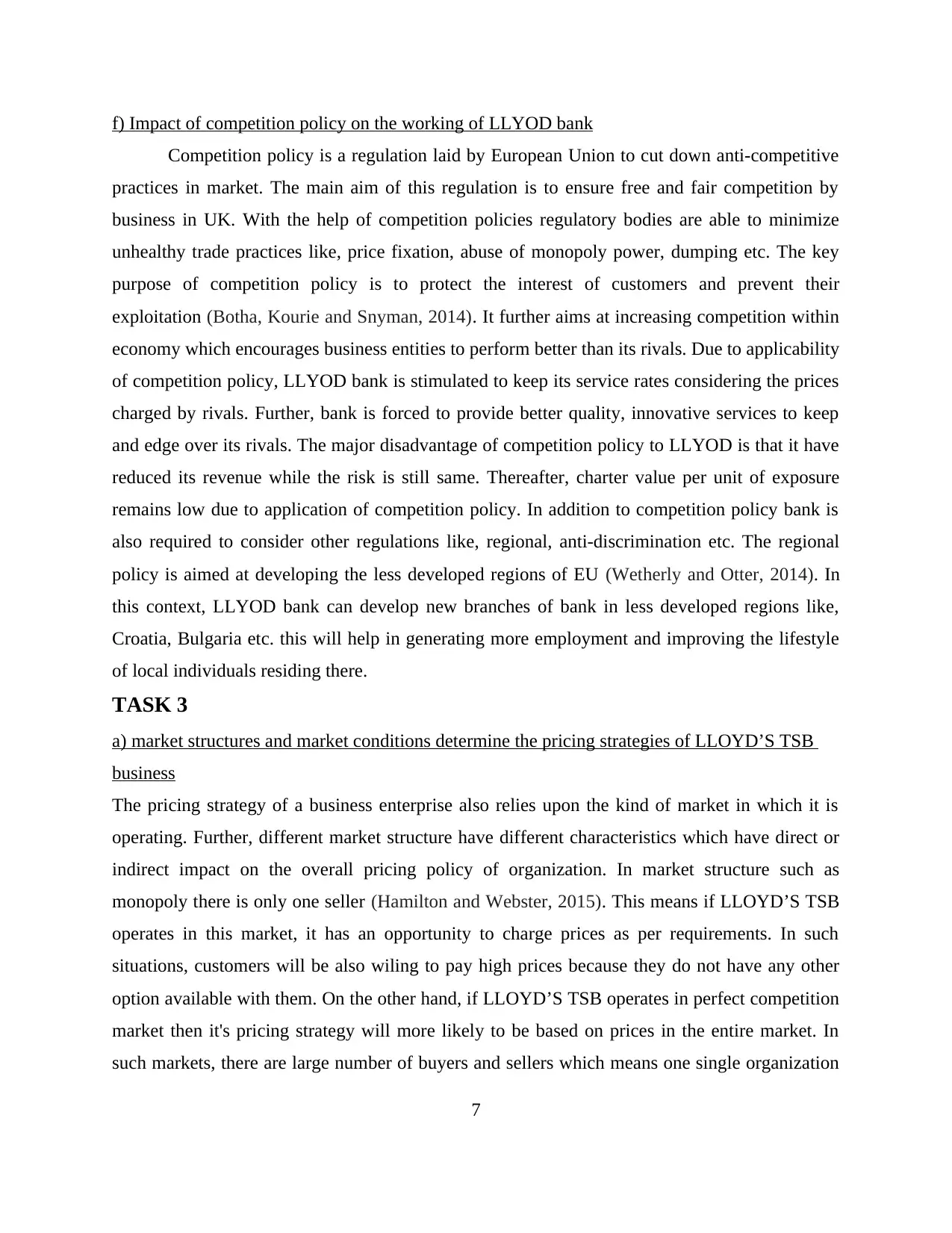
f) Impact of competition policy on the working of LLYOD bank
Competition policy is a regulation laid by European Union to cut down anti-competitive
practices in market. The main aim of this regulation is to ensure free and fair competition by
business in UK. With the help of competition policies regulatory bodies are able to minimize
unhealthy trade practices like, price fixation, abuse of monopoly power, dumping etc. The key
purpose of competition policy is to protect the interest of customers and prevent their
exploitation (Botha, Kourie and Snyman, 2014). It further aims at increasing competition within
economy which encourages business entities to perform better than its rivals. Due to applicability
of competition policy, LLYOD bank is stimulated to keep its service rates considering the prices
charged by rivals. Further, bank is forced to provide better quality, innovative services to keep
and edge over its rivals. The major disadvantage of competition policy to LLYOD is that it have
reduced its revenue while the risk is still same. Thereafter, charter value per unit of exposure
remains low due to application of competition policy. In addition to competition policy bank is
also required to consider other regulations like, regional, anti-discrimination etc. The regional
policy is aimed at developing the less developed regions of EU (Wetherly and Otter, 2014). In
this context, LLYOD bank can develop new branches of bank in less developed regions like,
Croatia, Bulgaria etc. this will help in generating more employment and improving the lifestyle
of local individuals residing there.
TASK 3
a) market structures and market conditions determine the pricing strategies of LLOYD’S TSB
business
The pricing strategy of a business enterprise also relies upon the kind of market in which it is
operating. Further, different market structure have different characteristics which have direct or
indirect impact on the overall pricing policy of organization. In market structure such as
monopoly there is only one seller (Hamilton and Webster, 2015). This means if LLOYD’S TSB
operates in this market, it has an opportunity to charge prices as per requirements. In such
situations, customers will be also wiling to pay high prices because they do not have any other
option available with them. On the other hand, if LLOYD’S TSB operates in perfect competition
market then it's pricing strategy will more likely to be based on prices in the entire market. In
such markets, there are large number of buyers and sellers which means one single organization
7
Competition policy is a regulation laid by European Union to cut down anti-competitive
practices in market. The main aim of this regulation is to ensure free and fair competition by
business in UK. With the help of competition policies regulatory bodies are able to minimize
unhealthy trade practices like, price fixation, abuse of monopoly power, dumping etc. The key
purpose of competition policy is to protect the interest of customers and prevent their
exploitation (Botha, Kourie and Snyman, 2014). It further aims at increasing competition within
economy which encourages business entities to perform better than its rivals. Due to applicability
of competition policy, LLYOD bank is stimulated to keep its service rates considering the prices
charged by rivals. Further, bank is forced to provide better quality, innovative services to keep
and edge over its rivals. The major disadvantage of competition policy to LLYOD is that it have
reduced its revenue while the risk is still same. Thereafter, charter value per unit of exposure
remains low due to application of competition policy. In addition to competition policy bank is
also required to consider other regulations like, regional, anti-discrimination etc. The regional
policy is aimed at developing the less developed regions of EU (Wetherly and Otter, 2014). In
this context, LLYOD bank can develop new branches of bank in less developed regions like,
Croatia, Bulgaria etc. this will help in generating more employment and improving the lifestyle
of local individuals residing there.
TASK 3
a) market structures and market conditions determine the pricing strategies of LLOYD’S TSB
business
The pricing strategy of a business enterprise also relies upon the kind of market in which it is
operating. Further, different market structure have different characteristics which have direct or
indirect impact on the overall pricing policy of organization. In market structure such as
monopoly there is only one seller (Hamilton and Webster, 2015). This means if LLOYD’S TSB
operates in this market, it has an opportunity to charge prices as per requirements. In such
situations, customers will be also wiling to pay high prices because they do not have any other
option available with them. On the other hand, if LLOYD’S TSB operates in perfect competition
market then it's pricing strategy will more likely to be based on prices in the entire market. In
such markets, there are large number of buyers and sellers which means one single organization
7
Paraphrase This Document
Need a fresh take? Get an instant paraphrase of this document with our AI Paraphraser
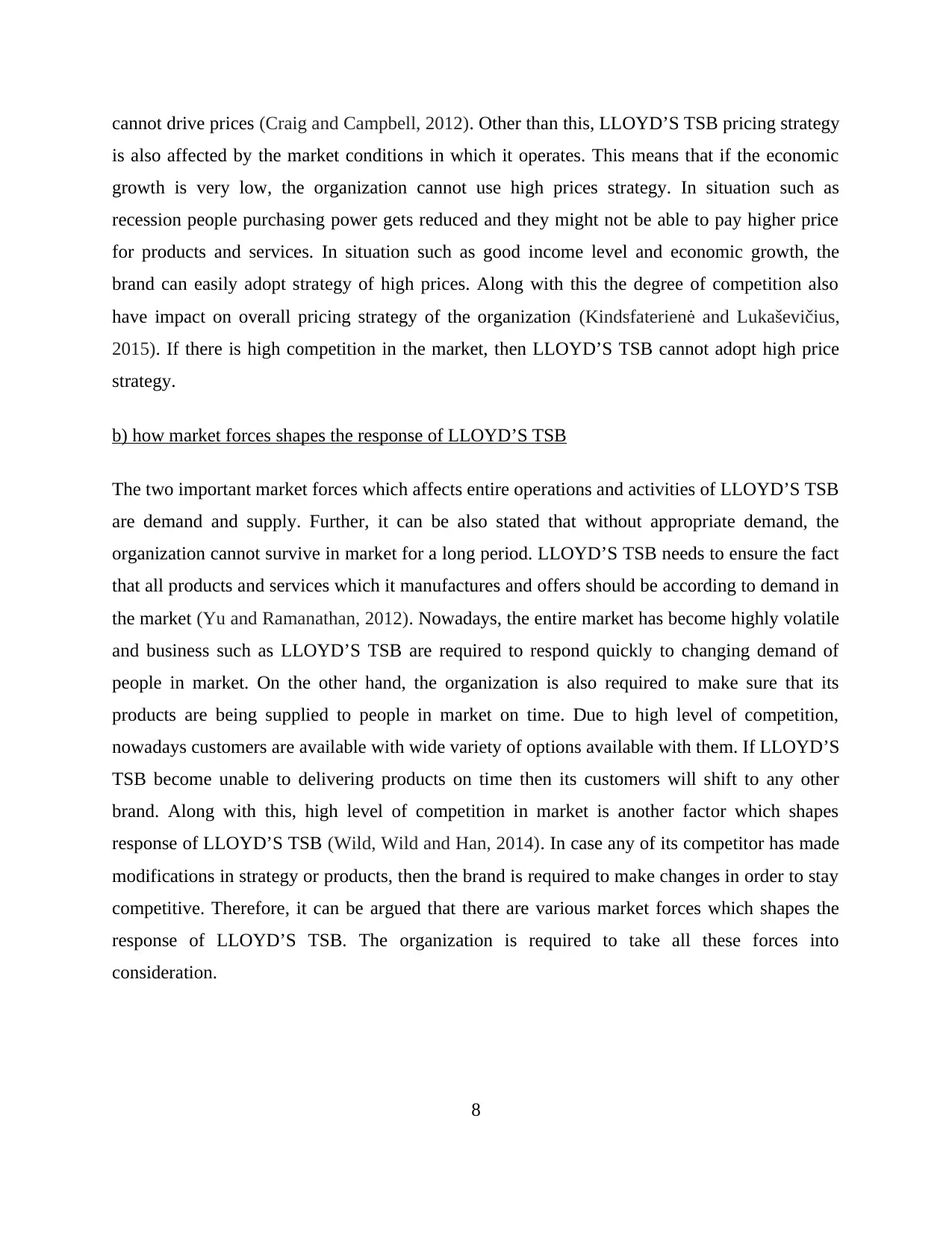
cannot drive prices (Craig and Campbell, 2012). Other than this, LLOYD’S TSB pricing strategy
is also affected by the market conditions in which it operates. This means that if the economic
growth is very low, the organization cannot use high prices strategy. In situation such as
recession people purchasing power gets reduced and they might not be able to pay higher price
for products and services. In situation such as good income level and economic growth, the
brand can easily adopt strategy of high prices. Along with this the degree of competition also
have impact on overall pricing strategy of the organization (Kindsfaterienė and Lukaševičius,
2015). If there is high competition in the market, then LLOYD’S TSB cannot adopt high price
strategy.
b) how market forces shapes the response of LLOYD’S TSB
The two important market forces which affects entire operations and activities of LLOYD’S TSB
are demand and supply. Further, it can be also stated that without appropriate demand, the
organization cannot survive in market for a long period. LLOYD’S TSB needs to ensure the fact
that all products and services which it manufactures and offers should be according to demand in
the market (Yu and Ramanathan, 2012). Nowadays, the entire market has become highly volatile
and business such as LLOYD’S TSB are required to respond quickly to changing demand of
people in market. On the other hand, the organization is also required to make sure that its
products are being supplied to people in market on time. Due to high level of competition,
nowadays customers are available with wide variety of options available with them. If LLOYD’S
TSB become unable to delivering products on time then its customers will shift to any other
brand. Along with this, high level of competition in market is another factor which shapes
response of LLOYD’S TSB (Wild, Wild and Han, 2014). In case any of its competitor has made
modifications in strategy or products, then the brand is required to make changes in order to stay
competitive. Therefore, it can be argued that there are various market forces which shapes the
response of LLOYD’S TSB. The organization is required to take all these forces into
consideration.
8
is also affected by the market conditions in which it operates. This means that if the economic
growth is very low, the organization cannot use high prices strategy. In situation such as
recession people purchasing power gets reduced and they might not be able to pay higher price
for products and services. In situation such as good income level and economic growth, the
brand can easily adopt strategy of high prices. Along with this the degree of competition also
have impact on overall pricing strategy of the organization (Kindsfaterienė and Lukaševičius,
2015). If there is high competition in the market, then LLOYD’S TSB cannot adopt high price
strategy.
b) how market forces shapes the response of LLOYD’S TSB
The two important market forces which affects entire operations and activities of LLOYD’S TSB
are demand and supply. Further, it can be also stated that without appropriate demand, the
organization cannot survive in market for a long period. LLOYD’S TSB needs to ensure the fact
that all products and services which it manufactures and offers should be according to demand in
the market (Yu and Ramanathan, 2012). Nowadays, the entire market has become highly volatile
and business such as LLOYD’S TSB are required to respond quickly to changing demand of
people in market. On the other hand, the organization is also required to make sure that its
products are being supplied to people in market on time. Due to high level of competition,
nowadays customers are available with wide variety of options available with them. If LLOYD’S
TSB become unable to delivering products on time then its customers will shift to any other
brand. Along with this, high level of competition in market is another factor which shapes
response of LLOYD’S TSB (Wild, Wild and Han, 2014). In case any of its competitor has made
modifications in strategy or products, then the brand is required to make changes in order to stay
competitive. Therefore, it can be argued that there are various market forces which shapes the
response of LLOYD’S TSB. The organization is required to take all these forces into
consideration.
8
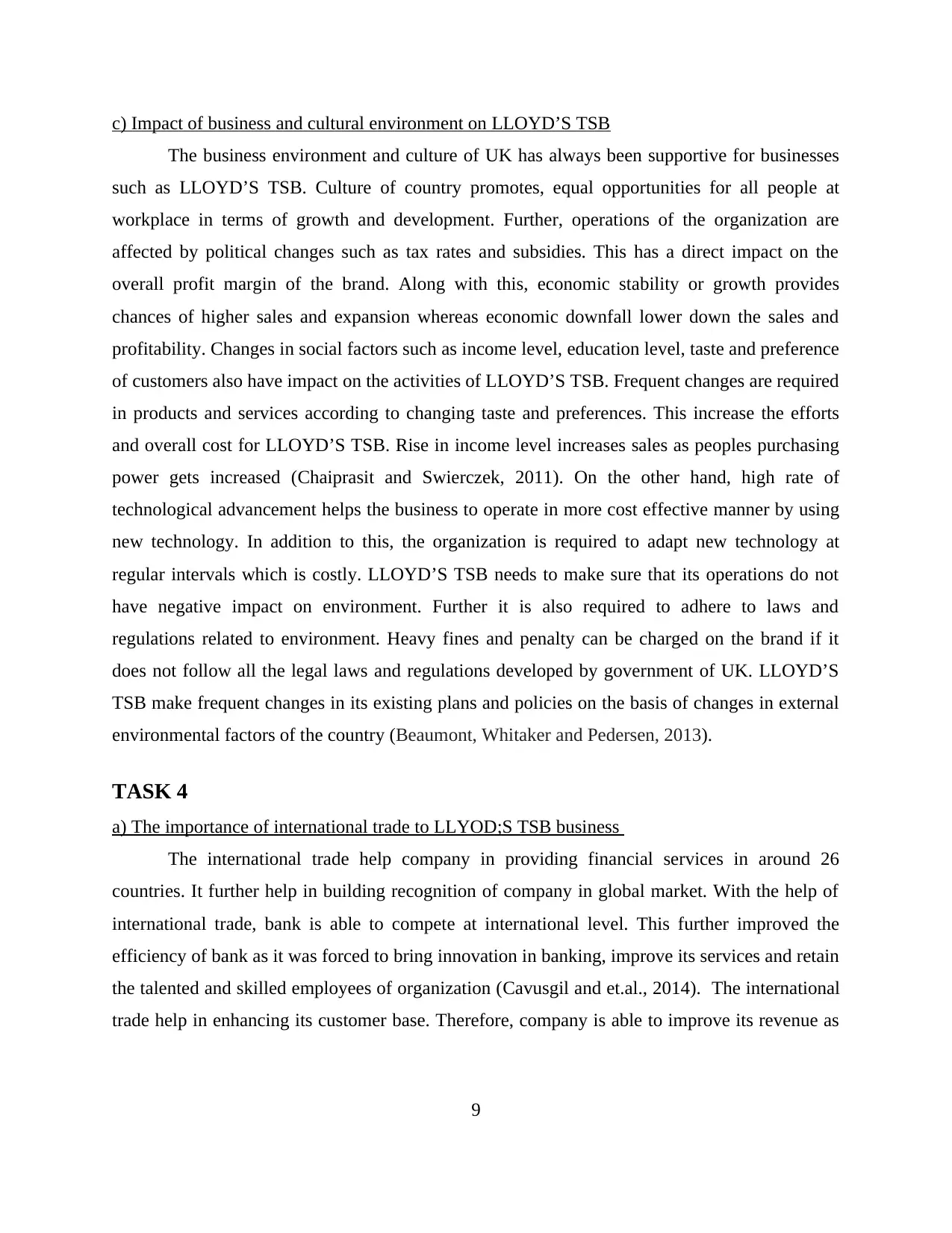
c) Impact of business and cultural environment on LLOYD’S TSB
The business environment and culture of UK has always been supportive for businesses
such as LLOYD’S TSB. Culture of country promotes, equal opportunities for all people at
workplace in terms of growth and development. Further, operations of the organization are
affected by political changes such as tax rates and subsidies. This has a direct impact on the
overall profit margin of the brand. Along with this, economic stability or growth provides
chances of higher sales and expansion whereas economic downfall lower down the sales and
profitability. Changes in social factors such as income level, education level, taste and preference
of customers also have impact on the activities of LLOYD’S TSB. Frequent changes are required
in products and services according to changing taste and preferences. This increase the efforts
and overall cost for LLOYD’S TSB. Rise in income level increases sales as peoples purchasing
power gets increased (Chaiprasit and Swierczek, 2011). On the other hand, high rate of
technological advancement helps the business to operate in more cost effective manner by using
new technology. In addition to this, the organization is required to adapt new technology at
regular intervals which is costly. LLOYD’S TSB needs to make sure that its operations do not
have negative impact on environment. Further it is also required to adhere to laws and
regulations related to environment. Heavy fines and penalty can be charged on the brand if it
does not follow all the legal laws and regulations developed by government of UK. LLOYD’S
TSB make frequent changes in its existing plans and policies on the basis of changes in external
environmental factors of the country (Beaumont, Whitaker and Pedersen, 2013).
TASK 4
a) The importance of international trade to LLYOD;S TSB business
The international trade help company in providing financial services in around 26
countries. It further help in building recognition of company in global market. With the help of
international trade, bank is able to compete at international level. This further improved the
efficiency of bank as it was forced to bring innovation in banking, improve its services and retain
the talented and skilled employees of organization (Cavusgil and et.al., 2014). The international
trade help in enhancing its customer base. Therefore, company is able to improve its revenue as
9
The business environment and culture of UK has always been supportive for businesses
such as LLOYD’S TSB. Culture of country promotes, equal opportunities for all people at
workplace in terms of growth and development. Further, operations of the organization are
affected by political changes such as tax rates and subsidies. This has a direct impact on the
overall profit margin of the brand. Along with this, economic stability or growth provides
chances of higher sales and expansion whereas economic downfall lower down the sales and
profitability. Changes in social factors such as income level, education level, taste and preference
of customers also have impact on the activities of LLOYD’S TSB. Frequent changes are required
in products and services according to changing taste and preferences. This increase the efforts
and overall cost for LLOYD’S TSB. Rise in income level increases sales as peoples purchasing
power gets increased (Chaiprasit and Swierczek, 2011). On the other hand, high rate of
technological advancement helps the business to operate in more cost effective manner by using
new technology. In addition to this, the organization is required to adapt new technology at
regular intervals which is costly. LLOYD’S TSB needs to make sure that its operations do not
have negative impact on environment. Further it is also required to adhere to laws and
regulations related to environment. Heavy fines and penalty can be charged on the brand if it
does not follow all the legal laws and regulations developed by government of UK. LLOYD’S
TSB make frequent changes in its existing plans and policies on the basis of changes in external
environmental factors of the country (Beaumont, Whitaker and Pedersen, 2013).
TASK 4
a) The importance of international trade to LLYOD;S TSB business
The international trade help company in providing financial services in around 26
countries. It further help in building recognition of company in global market. With the help of
international trade, bank is able to compete at international level. This further improved the
efficiency of bank as it was forced to bring innovation in banking, improve its services and retain
the talented and skilled employees of organization (Cavusgil and et.al., 2014). The international
trade help in enhancing its customer base. Therefore, company is able to improve its revenue as
9
⊘ This is a preview!⊘
Do you want full access?
Subscribe today to unlock all pages.

Trusted by 1+ million students worldwide
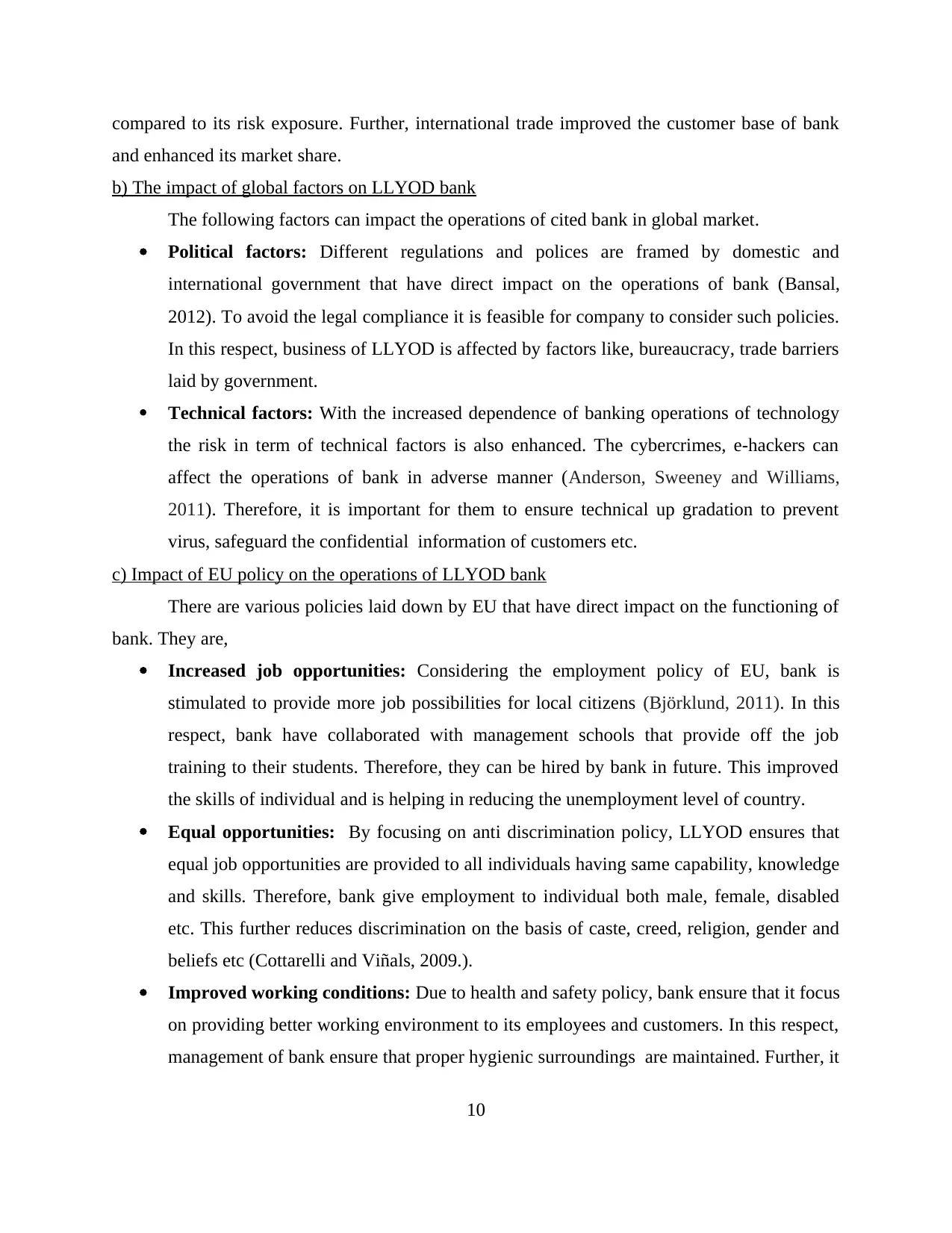
compared to its risk exposure. Further, international trade improved the customer base of bank
and enhanced its market share.
b) The impact of global factors on LLYOD bank
The following factors can impact the operations of cited bank in global market.
Political factors: Different regulations and polices are framed by domestic and
international government that have direct impact on the operations of bank (Bansal,
2012). To avoid the legal compliance it is feasible for company to consider such policies.
In this respect, business of LLYOD is affected by factors like, bureaucracy, trade barriers
laid by government.
Technical factors: With the increased dependence of banking operations of technology
the risk in term of technical factors is also enhanced. The cybercrimes, e-hackers can
affect the operations of bank in adverse manner (Anderson, Sweeney and Williams,
2011). Therefore, it is important for them to ensure technical up gradation to prevent
virus, safeguard the confidential information of customers etc.
c) Impact of EU policy on the operations of LLYOD bank
There are various policies laid down by EU that have direct impact on the functioning of
bank. They are,
Increased job opportunities: Considering the employment policy of EU, bank is
stimulated to provide more job possibilities for local citizens (Björklund, 2011). In this
respect, bank have collaborated with management schools that provide off the job
training to their students. Therefore, they can be hired by bank in future. This improved
the skills of individual and is helping in reducing the unemployment level of country.
Equal opportunities: By focusing on anti discrimination policy, LLYOD ensures that
equal job opportunities are provided to all individuals having same capability, knowledge
and skills. Therefore, bank give employment to individual both male, female, disabled
etc. This further reduces discrimination on the basis of caste, creed, religion, gender and
beliefs etc (Cottarelli and Viñals, 2009.).
Improved working conditions: Due to health and safety policy, bank ensure that it focus
on providing better working environment to its employees and customers. In this respect,
management of bank ensure that proper hygienic surroundings are maintained. Further, it
10
and enhanced its market share.
b) The impact of global factors on LLYOD bank
The following factors can impact the operations of cited bank in global market.
Political factors: Different regulations and polices are framed by domestic and
international government that have direct impact on the operations of bank (Bansal,
2012). To avoid the legal compliance it is feasible for company to consider such policies.
In this respect, business of LLYOD is affected by factors like, bureaucracy, trade barriers
laid by government.
Technical factors: With the increased dependence of banking operations of technology
the risk in term of technical factors is also enhanced. The cybercrimes, e-hackers can
affect the operations of bank in adverse manner (Anderson, Sweeney and Williams,
2011). Therefore, it is important for them to ensure technical up gradation to prevent
virus, safeguard the confidential information of customers etc.
c) Impact of EU policy on the operations of LLYOD bank
There are various policies laid down by EU that have direct impact on the functioning of
bank. They are,
Increased job opportunities: Considering the employment policy of EU, bank is
stimulated to provide more job possibilities for local citizens (Björklund, 2011). In this
respect, bank have collaborated with management schools that provide off the job
training to their students. Therefore, they can be hired by bank in future. This improved
the skills of individual and is helping in reducing the unemployment level of country.
Equal opportunities: By focusing on anti discrimination policy, LLYOD ensures that
equal job opportunities are provided to all individuals having same capability, knowledge
and skills. Therefore, bank give employment to individual both male, female, disabled
etc. This further reduces discrimination on the basis of caste, creed, religion, gender and
beliefs etc (Cottarelli and Viñals, 2009.).
Improved working conditions: Due to health and safety policy, bank ensure that it focus
on providing better working environment to its employees and customers. In this respect,
management of bank ensure that proper hygienic surroundings are maintained. Further, it
10
Paraphrase This Document
Need a fresh take? Get an instant paraphrase of this document with our AI Paraphraser
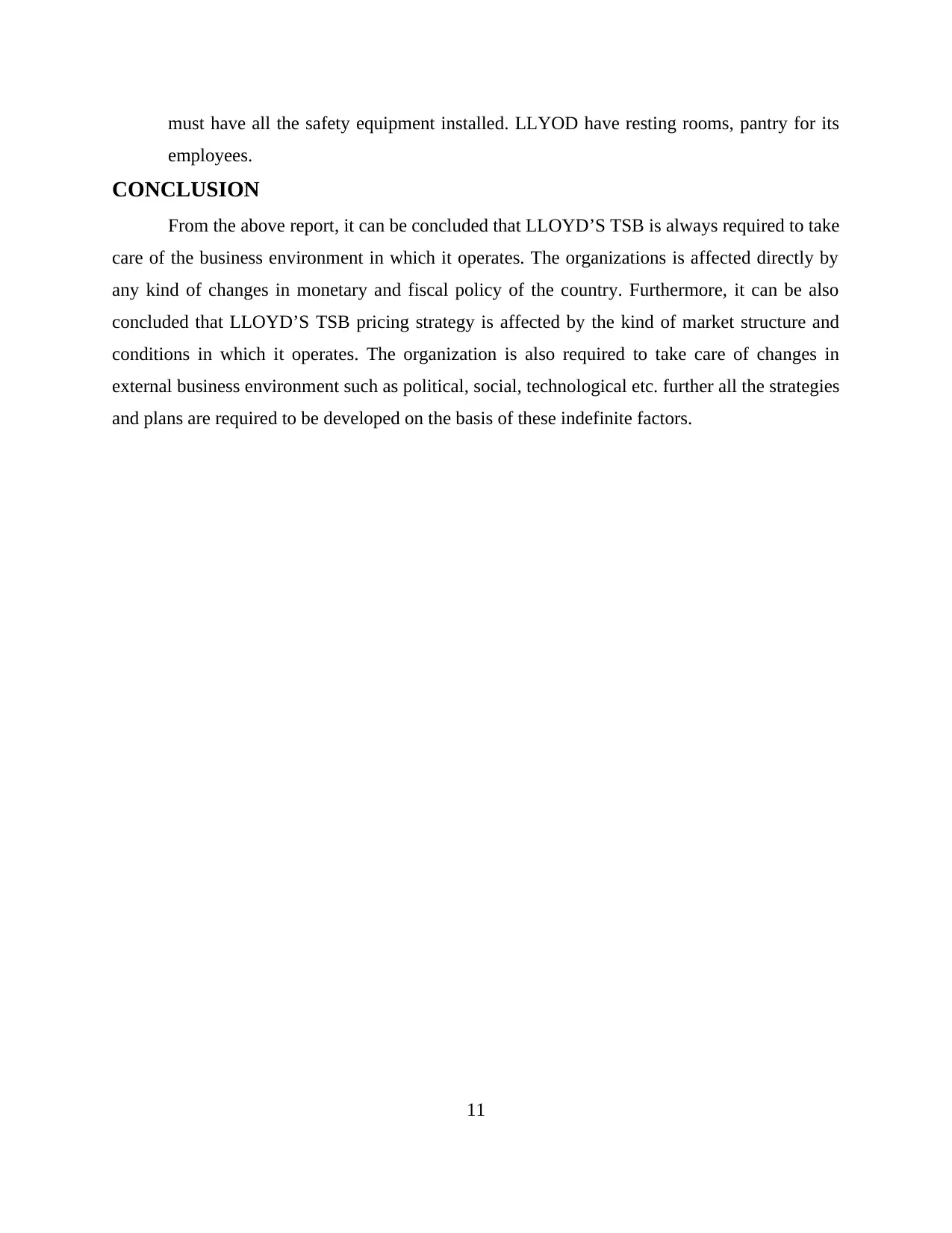
must have all the safety equipment installed. LLYOD have resting rooms, pantry for its
employees.
CONCLUSION
From the above report, it can be concluded that LLOYD’S TSB is always required to take
care of the business environment in which it operates. The organizations is affected directly by
any kind of changes in monetary and fiscal policy of the country. Furthermore, it can be also
concluded that LLOYD’S TSB pricing strategy is affected by the kind of market structure and
conditions in which it operates. The organization is also required to take care of changes in
external business environment such as political, social, technological etc. further all the strategies
and plans are required to be developed on the basis of these indefinite factors.
11
employees.
CONCLUSION
From the above report, it can be concluded that LLOYD’S TSB is always required to take
care of the business environment in which it operates. The organizations is affected directly by
any kind of changes in monetary and fiscal policy of the country. Furthermore, it can be also
concluded that LLOYD’S TSB pricing strategy is affected by the kind of market structure and
conditions in which it operates. The organization is also required to take care of changes in
external business environment such as political, social, technological etc. further all the strategies
and plans are required to be developed on the basis of these indefinite factors.
11
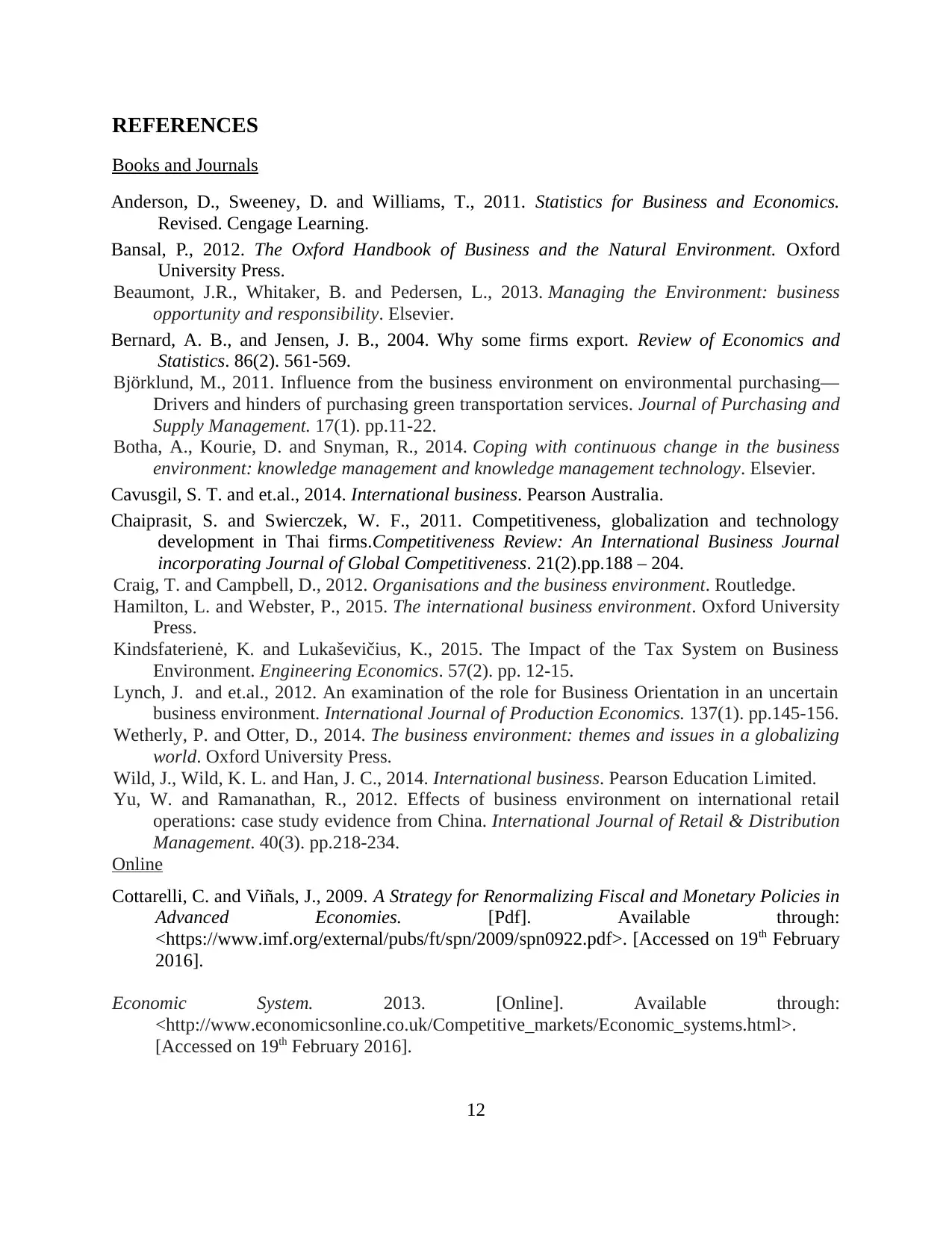
REFERENCES
Books and Journals
Anderson, D., Sweeney, D. and Williams, T., 2011. Statistics for Business and Economics.
Revised. Cengage Learning.
Bansal, P., 2012. The Oxford Handbook of Business and the Natural Environment. Oxford
University Press.
Beaumont, J.R., Whitaker, B. and Pedersen, L., 2013. Managing the Environment: business
opportunity and responsibility. Elsevier.
Bernard, A. B., and Jensen, J. B., 2004. Why some firms export. Review of Economics and
Statistics. 86(2). 561-569.
Björklund, M., 2011. Influence from the business environment on environmental purchasing—
Drivers and hinders of purchasing green transportation services. Journal of Purchasing and
Supply Management. 17(1). pp.11-22.
Botha, A., Kourie, D. and Snyman, R., 2014. Coping with continuous change in the business
environment: knowledge management and knowledge management technology. Elsevier.
Cavusgil, S. T. and et.al., 2014. International business. Pearson Australia.
Chaiprasit, S. and Swierczek, W. F., 2011. Competitiveness, globalization and technology
development in Thai firms.Competitiveness Review: An International Business Journal
incorporating Journal of Global Competitiveness. 21(2).pp.188 – 204.
Craig, T. and Campbell, D., 2012. Organisations and the business environment. Routledge.
Hamilton, L. and Webster, P., 2015. The international business environment. Oxford University
Press.
Kindsfaterienė, K. and Lukaševičius, K., 2015. The Impact of the Tax System on Business
Environment. Engineering Economics. 57(2). pp. 12-15.
Lynch, J. and et.al., 2012. An examination of the role for Business Orientation in an uncertain
business environment. International Journal of Production Economics. 137(1). pp.145-156.
Wetherly, P. and Otter, D., 2014. The business environment: themes and issues in a globalizing
world. Oxford University Press.
Wild, J., Wild, K. L. and Han, J. C., 2014. International business. Pearson Education Limited.
Yu, W. and Ramanathan, R., 2012. Effects of business environment on international retail
operations: case study evidence from China. International Journal of Retail & Distribution
Management. 40(3). pp.218-234.
Online
Cottarelli, C. and Viñals, J., 2009. A Strategy for Renormalizing Fiscal and Monetary Policies in
Advanced Economies. [Pdf]. Available through:
<https://www.imf.org/external/pubs/ft/spn/2009/spn0922.pdf>. [Accessed on 19th February
2016].
Economic System. 2013. [Online]. Available through:
<http://www.economicsonline.co.uk/Competitive_markets/Economic_systems.html>.
[Accessed on 19th February 2016].
12
Books and Journals
Anderson, D., Sweeney, D. and Williams, T., 2011. Statistics for Business and Economics.
Revised. Cengage Learning.
Bansal, P., 2012. The Oxford Handbook of Business and the Natural Environment. Oxford
University Press.
Beaumont, J.R., Whitaker, B. and Pedersen, L., 2013. Managing the Environment: business
opportunity and responsibility. Elsevier.
Bernard, A. B., and Jensen, J. B., 2004. Why some firms export. Review of Economics and
Statistics. 86(2). 561-569.
Björklund, M., 2011. Influence from the business environment on environmental purchasing—
Drivers and hinders of purchasing green transportation services. Journal of Purchasing and
Supply Management. 17(1). pp.11-22.
Botha, A., Kourie, D. and Snyman, R., 2014. Coping with continuous change in the business
environment: knowledge management and knowledge management technology. Elsevier.
Cavusgil, S. T. and et.al., 2014. International business. Pearson Australia.
Chaiprasit, S. and Swierczek, W. F., 2011. Competitiveness, globalization and technology
development in Thai firms.Competitiveness Review: An International Business Journal
incorporating Journal of Global Competitiveness. 21(2).pp.188 – 204.
Craig, T. and Campbell, D., 2012. Organisations and the business environment. Routledge.
Hamilton, L. and Webster, P., 2015. The international business environment. Oxford University
Press.
Kindsfaterienė, K. and Lukaševičius, K., 2015. The Impact of the Tax System on Business
Environment. Engineering Economics. 57(2). pp. 12-15.
Lynch, J. and et.al., 2012. An examination of the role for Business Orientation in an uncertain
business environment. International Journal of Production Economics. 137(1). pp.145-156.
Wetherly, P. and Otter, D., 2014. The business environment: themes and issues in a globalizing
world. Oxford University Press.
Wild, J., Wild, K. L. and Han, J. C., 2014. International business. Pearson Education Limited.
Yu, W. and Ramanathan, R., 2012. Effects of business environment on international retail
operations: case study evidence from China. International Journal of Retail & Distribution
Management. 40(3). pp.218-234.
Online
Cottarelli, C. and Viñals, J., 2009. A Strategy for Renormalizing Fiscal and Monetary Policies in
Advanced Economies. [Pdf]. Available through:
<https://www.imf.org/external/pubs/ft/spn/2009/spn0922.pdf>. [Accessed on 19th February
2016].
Economic System. 2013. [Online]. Available through:
<http://www.economicsonline.co.uk/Competitive_markets/Economic_systems.html>.
[Accessed on 19th February 2016].
12
⊘ This is a preview!⊘
Do you want full access?
Subscribe today to unlock all pages.

Trusted by 1+ million students worldwide
1 out of 13
Related Documents
Your All-in-One AI-Powered Toolkit for Academic Success.
+13062052269
info@desklib.com
Available 24*7 on WhatsApp / Email
![[object Object]](/_next/static/media/star-bottom.7253800d.svg)
Unlock your academic potential
Copyright © 2020–2025 A2Z Services. All Rights Reserved. Developed and managed by ZUCOL.





